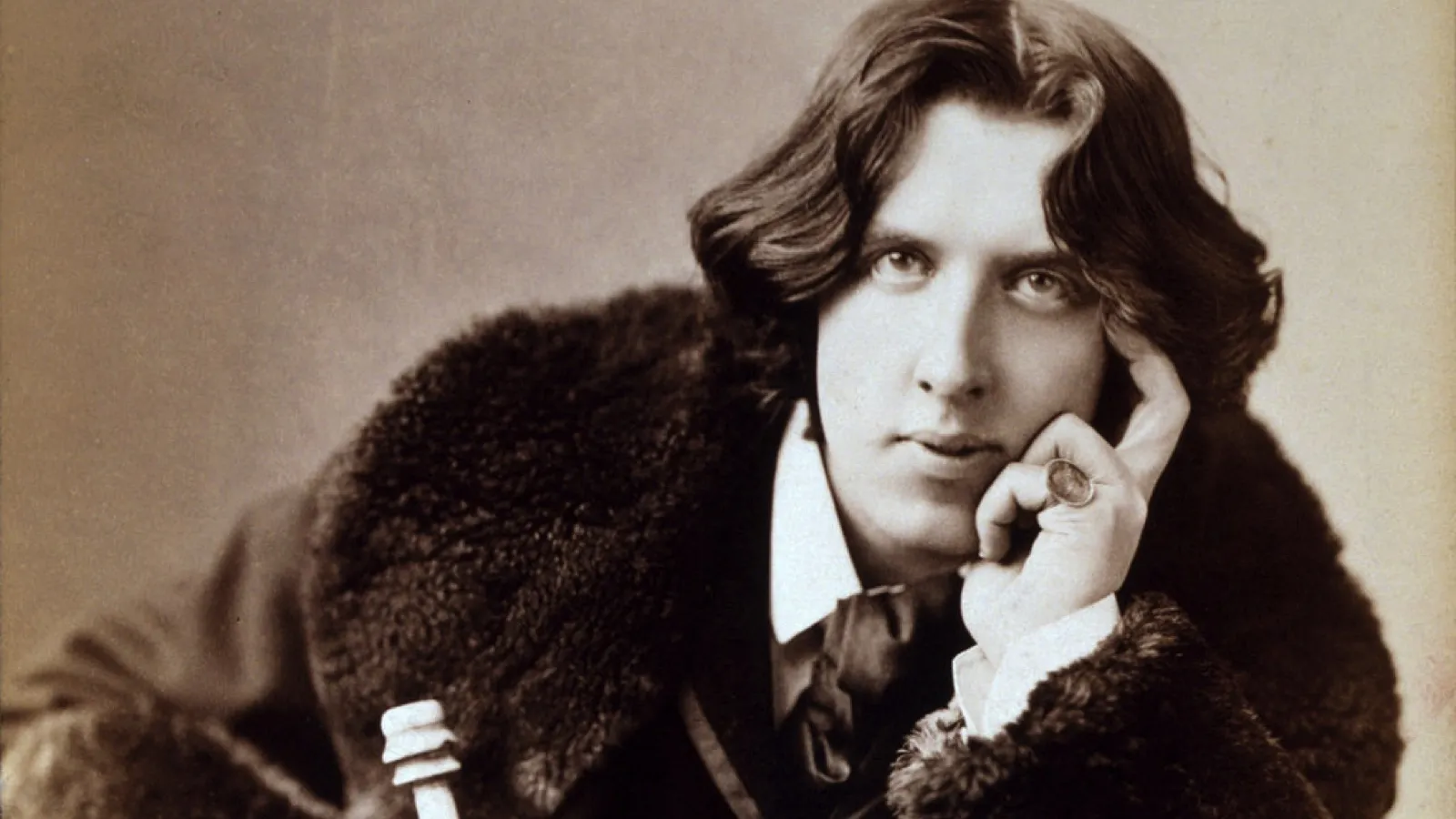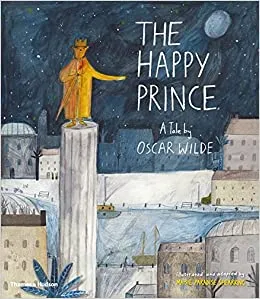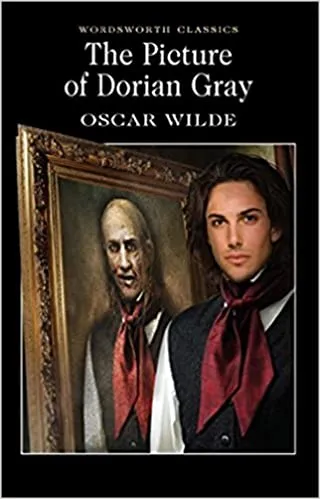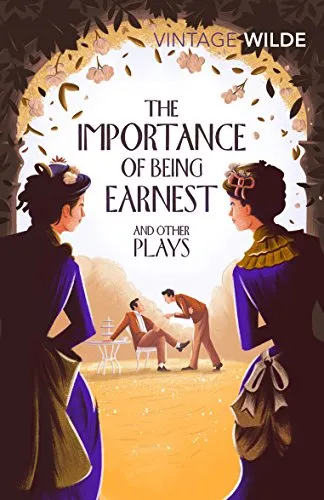The Life and Times of Oscar Wilde
Oscar Wilde has captured the imagination of several generations now, readers and non-readers alike. Even people who have not read any of the things he wrote are likely to know something about his sartorial elegance and a couple of quotes attributed (or misattributed) to him. Oscar Wilde has become a literary icon for the LGBTQ+ community. His life was tragic as a result of being both persecuted and prosecuted for his homosexuality.
Oscar Wilde’s artistic sensibilities expressed themselves through his carefully constructed personality and his small but brilliant set of literary productions. While he is probably one of the most misquoted authors in literary history (for example, there is no evidence of him having ever said “Be yourself; everyone else is already taken”), he never seemed to have run out of funny and profoundly wise things to say. Join us, on this exploration of different aspects of the life and times of the king of comebacks that made him the icon that he is, guided by what he himself might have had to say about them.
Oscar Wilde’s Early Life and Family
“The Gods had given me everything … (but) tired of being on the heights I deliberately went to the depths in the search of new sensation”
Oscar Wilde, De Profundis (1897)
Wilde was born Oscar Fingal O’Flahertie Wills Wilde on 16 October 1854, in Dublin, in the house which now houses the Oscar Wilde Centre of Trinity College. He was the second child of Sir William and Jane (née Elgee) Wilde, both well-known Irish intellectuals of their times. Sir William was a surgeon and a philanthropist,; his clinic in Dublin was the forerunner of the Dublin Eye and Ear Hospital. He often treated the poor for free, sometimes accepting stories from them in lieu of payment. He published books on architecture and Irish folklore.
Oscar Wilde’s earliest literary influence was his mother, who was a devoted Irish nationalist poet and wrote under the pen name Speranza. As Richard Ellman observes in his biography of Wilde, he probably also inherited his tendency for self-dramatization from his mother, who chose an Italian pseudonym instead of the plain English Jane, and claimed to be a descendant of Dante.
Wilde was a brilliant student all his life, coasting through school and Trinity college in Ireland and then winning a scholarship to Magdalen College, Oxford. It was here that he started building for himself his larger-than-life persona, one that would spill into his art and immortalize him, but also prove to be fatally inconvenient.
At Oxford, Wilde’s instinctive disregard for rules and societal expectations became apparent. He was once punished for a term because he was late in returning from a vacation in Greece. Wilde dressed flamboyantly, decked up his room in finery and lavishly entertained friends. He is reported to have said to his friends, “I find it harder and harder every day to live up to my blue china”.
At Oxford, Wilde was influenced by the works of Walter Pater, the foremost proponent of the aesthetic movement, which valued aesthetics and the appreciation of beauty in arts as more important than its socio-political message. “Art for art’s sake” was advocated by the movement. In context of the stifling, formulaic morality that Victorian society expected of its literature, this was quite the revolutionary slogan. Wilde was also influenced by John Ruskin, who recognized the importance of beauty in art but believed that it behooved the artist to align his art with moral good. While these two positions are contradictory, Wilde synthesized these theses through his espousal of Hegelian dialectics, a school of thought that recognized the inevitability (even necessity) of contradiction, stating, later, that consistency is the mark of “the dullard and the doctrinaire”.
While Wilde was ridiculed by some of his contemporaries as a lily-sniffing dandy, he surprised everyone by graduating with a double first in his B.A. in Greek and Latin Literature and Philosophy (Literae Humaniores) and singlehandedly repelling a physical assault by four of his fellow students. He also won the Newdigate Prize for his poem Ravenna in 1878.
Oscar Wilde Poems
“In all unimportant matters, style, not sincerity, is the essential. In all important matters, style, not sincerity, is the essential.”
Oscar Wilde, Phrases and Philosophies for the Use of the Very Young (1894)
After graduating from Oxford and a brief visit to Ireland, Wilde installed himself as a bachelor in London, living off the rents of property he inherited upon the death of his father. In 1881, he self-published a volume of poems. The critical response to the Poems was largely negative, and as Ruth Robbins demonstrates in her book on Oscar Wilde, dictated by the expectations of post-Romantic Victorian society.
Victorian critics demanded both sincerity and restraint from good poetry, very much blind to the inherent contradiction of these requirements. With his Poems, Oscar Wilde upended both expectations – insincere in his borrowing from the tone, imagery and form of earlier romantic poets and superfluous, obscene – unmanly – in his unrestrained infusion of lush, sensual imagery into the poems.
His greatest humiliation in this context came when a copy gifted by him to the Oxford Union Library was returned due to charges of plagiarism, and nothing that Wilde had to say about the tone of the accusations or the ill manners of returning a gift could do anything to reverse the decision.
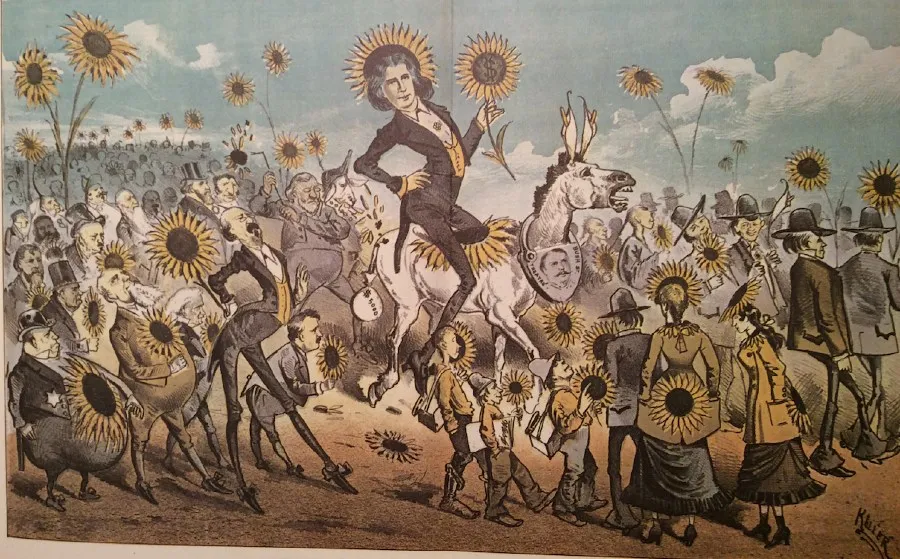
Oscar Wilde’s Tour of America
“In America the President rules for four years, and Journalism governs for ever and ever.”
Oscar Wilde, The Soul of a Man Under Socialism (1891)
Though Wilde’s Poems failed to garner critical success, it further solidified his position in the aestheticism movement and got him his big break – a tour of America, the beginning of his character as professional lecturer and dazzler. The volume brought him to the attention of Richard D’Oyly Carte, who was promoting Gilbert and Sullivan’s operetta production mocking aestheticism, Patience, or Bunthorne’s Bride. The operetta was to embark on a tour of America.
Afraid that Americans, unaware of aestheticism, would fail to grasp the satire, O’Doyle proposed to send Wilde, an authentic aesthete, on a lecturing tour of America in order to promote his play. Wilde agreed.
Wilde’s reputation preceded him across the Atlantic – he was greeted with relentless caricaturing and mocking in newspapers, fueled by anti-Irish sentiments and tales of Wilde’s effeminate, pretentious eccentricities. However, Wilde soon turned all the public attention to his advantage and his lecture tours were a resounding success. He spoke on the English Renaissance and, realizing that the topic was too esoteric for his audience, on interior decoration.
Wilde interacted with different social circles, from fashionable New York society to spending a night inside a silver mine in Colorado with miners and drinking everyone who dared challenge him under the table. The highest point of his tour probably was his meeting with Walt Whitman, his literary hero.
As for promoting a production that mocked him and his beliefs – a reporter from the New York Tribune accompanied Wilde to the Broadway show. According to him, that evening, as soon as Bunthorne, a stereotypical caricature of Wilde, broke into “I am an Aesthetic sham”, and the whole audience turned and looked at Wilde, “he leaned toward one of the ladies and said with a smile while looking at Bunthorne, ‘This is the compliment that mediocrity pays to those who are not mediocre.’”
Upon Wilde’s return to England, he further capitalized on the success of his American tour by touring the United Kingdom with a series of lectures about his experiences in America.
Marriage and Domesticity
“Oh, I love London society! It is entirely composed now of beautiful idiots and brilliant lunatics. Just what society should be.”
Oscar Wilde, An Ideal Husband, 1895
While Oscar Wilde’s homosexual relationships have been subject to much scholarship and scrutiny, his first forays into romance were with women. His childhood sweetheart was Florence Balcombe, who ended up marrying Bram Stoker (yes, of the Dracula fame). In 1884, Wilde married Constance Lloyd, with whom he spent a few years in marital bliss, by his own admission.
The Wildes set up their residence on Tite Street in Chelsea, and drew heavily upon Constance’s marriage portion and Oscar’s inheritance to maintain a house and a lifestyle befitting the famed aesthete. With his quick wit and sparkling conversation, Wilde established himself as one of the most sought-after dinner guests in London society.
The couple had two children, Cyril (born 1885) and Vyvyan (born 1886). While Wilde was a doting father, the second pregnancy estranged him from his wife, and in 1886 his first meeting with Robert Ross, regarded as Wilde’s first male lover and lifelong admirer and friend, began his series of homosexual relationships.
Constance and Oscar Wilde did not separate legally, but after Wilde’s fall from grace and subsequent imprisonment, Constance changed her and her sons’ last names to Holland and fled from England to protect themselves from the scandal. While Wilde did not see his wife and sons after his release from prison (Constance had visited him once in prison to bring him the news of his mother’s death), Constance continued to send him a small allowance out of her dwindling marriage portion.
Journalism and Literary Criticism
“Life imitates art far more than art imitates Life.”
Oscar Wilde, The Decay of Lying, 1889
In order to provide for his family and keep up his lavish lifestyle, Wilde started writing about art and literature in several journals. In 1887, he assumed editorship of The Lady’s World magazine, which he renamed to The Woman’s World. The change of name came with a drastic shift in content. The magazine retained its pieces on music fashion and gossip, but these topics were replaced at the center stage by more serious social and political discourse. By acknowledging that women deserved education and participation in political matters, Wilde challenged existing gender norms – a theme that would be present in a lot of his literary works.
In 1891, Wilde’s essays on literary criticism, The Decay of Lying, Pen, Pencil and Poison, The Truth of Masks, and The Critic as Artist in two parts, were published in a volume called Intentions. These essays emphasized the aesthetic dictum of ‘Art for art’s sake’. They highlighted the importance of inventiveness, AKA insincerity in art, and the impossibility of art to be truly realistic, since “Things are because we see them, and what we see, and how we see it, depends on the Arts that have influenced us”. From this stand point, criticism was an art in itself, for it was “a creation within a creation”.
In an essay-story titled The Portrait of Mr. W.H., Oscar Wilde expanded on the theory that Shakespeare’s sonnets were written for a young man, and not a woman. This piece probably scandalized the Victorians more than ever before, for it ‘tarnished’ the image of a national hero with allusions to homosexuality. While Wilde had initially considered including The Portrait of Mr. W.H. in Intentions, he decided against it. The piece was later classified as a story and published in later editions of Wilde’s collection of short stories for adults.
In his other seminal essay, The Soul of a Man Under Socialism, Wilde demonstrates, perhaps ironically, how the private ownership of property impedes creativity not only in the poor who do not own it, but also in the rich, who have to spend time disbursing of the duties that came with property ownership. With his mind characteristically open to contradictions, in this essay Wilde is able to imagine a society that is at the same time perfectly individualistic and socialist. Though he offers no insight into how such a system can be brought about, he explicitly recognizes the spirit crushing drudgery of capitalism and poverty, and socialism’s tendency towards totalitarianism.
Stories for Children
“…he (the reviewer) proceeds, apparently quite seriously, to make the extremely limited vocabulary at the disposal of the (average) British child the standard by which the prose of an artist is to be judged! Now in building this House of Pomegranates I had about as much intention of pleasing the British child as I had of pleasing the British public… No artist recognises any standard of beauty but that which is suggested by his own temperament.”
Oscar Wilde, in response to a review of his second book of short fiction for children, The House of Pomegranates (1891) Quoted in Oscar Wilde, by Ruth Robbins.
When I first read some of Wilde’s short stories meant for children as a child, I remember feeling confused at the lack of the kind of resolution I had learnt to expect from similar fairytale-like settings, and tantalized by the beautiful prose that I did not quite comprehend. Given Wilde’s own oscillating views of who these stories were actually meant for, and as an adult with more context, I understand that Oscar Wilde could not limit himself to the boundaries established in the genre of children’s fairy stories. He sometimes let his prose run wild (Wilde?), incorporating unresolved tragedies and sneaking in lustrous imagery that tickled his temperament.
In 1891, Oscar Wilde published a collection of short stories for adults, called Lord Arthur Savile’s Crime and Other Stories. This collection featured stories that were direct satires of Victorian society and the genre fiction that it had started to enjoy. Wilde injects humor and satire in the hitherto serious genres like horror and murder mystery, achieving the comic effect and the mastery over language that foresaw the brilliance of his widely successful social comedies.
The Picture of Dorian Gray
“Behind every exquisite thing that existed, there was something tragic.”
Oscar Wilde, The Picture of Dorian Gray (1890)
The Picture of Dorian Gray is Oscar Wilde’s only novel and along with The Portrait of Mr. W.H. is the most referred to as evidence during his trials. The novel is about the rather affected and corrupt Dorian Gray, who is terrified at the prospect of his beauty and vitality being ruined by time. When his devoted artist friend Basil Hallward paints a lifelike portrait of him, the portrait begins to show signs of aging and moral corruption, while the real Dorian Gray remains beautiful and pure.
The plot was the ultimate realization of Wilde’s musings about the relationship between life and art. He had also spoken about how he saw parts of himself in the three main male characters in the novel: Basil, Dorian, and Lord Henry. The book contained paragraphs that could be, and were, construed as homoerotic in context of the legal trials that Wilde would later be subject to – despite some of this content being purged from the book between its publication in the Lippincott’s Magazine in 1890 and its publication in volume form in 1891.
The Height of Popularity: Society Comedies
“…what consoles me nowadays is not repentance but pleasure. Repentance is quite out of date. And besides, if a woman really repents, she has to go to a bad dressmaker, otherwise no one believes in her. And nothing in the world would induce me to do that.”
Oscar Wilde, Lady Windermere’s Fan (1892)
Given Wilde’s penchant for flamboyance, it was no surprise that he was attracted to the theatre. His society comedies are, probably, the most popular and most enjoyable products of his pen. The plots of these plays are ‘realistic’ melodramas set in fashionable society, but Wilde combines melodrama with hilarious, but insightful, satire. A common target for his satire were traditional gender norms, as evidenced in the dialogue quoted above, where a female character states how society’s expectations of feminine repentance had reduced it to a performance, and rejects this performance for pleasure, a very non-feminine choice for the times.
Language plays an important role in these plays, exemplified in The Importance of Being Earnest, where the title itself is a play on the first name Ernest, which is the name of a (non-existent) character in the play, and the Victorian obsession with earnestness, or sincerity. It is in this play that Wilde coined the term Bunburying, a word that every introvert should love to have in their vocabulary. The word means “to avoid one’s duties and responsibilities by claiming to have appointments to see a fictitious person” and is derived from Bunbury, “an invaluable permanent invalid”, that one of the characters in the play invents and claims to visit whenever he needs to avoid social obligations. Oscar Wilde channels all his sparkling conversational wit into the sharp dialogue of his plays.
The Trials of Oscar Wilde
Edward Carson (Prosecutor): Have you ever adored a young man madly? – No, not madly; I prefer love – that is the higher form… I have never given admiration to anyone except myself.
Oscar Wilde, quoted in Oscar Wilde, by Ruth Robbins.
In 1891, Oscar Wilde met Lord Alfred ‘Bosie’ Douglas, described as a volatile and unstable man, whom Wilde was infatuated with despite his abusive nature. Their relationship enraged Douglas’s father, The Marquess of Queensberry, whose relationship with his son was already strained. In 1895, Queensberry decided to take matters into his own hands and sent an open postcard to Wilde at his club, accusing him of ‘posing as a sodomite’ (the words were notoriously misspelled).
Wilde sued Queensberry for criminal libel – the Criminal Law Amendment Act of 1885 had criminalized all forms of sexual activity between men. In hindsight, this might seem to be a poor decision, but Wilde did not have much choice in the matter, given the public nature of Queensberry’s attack.
During the criminal libel trial Queensberry proved, with the help of evidence obtained by private detectives, that his remarks about Wilde were justified. Wilde was forced to withdraw his charges. This trial, however, led to the issue of an arrest warrant for Wilde, on charges of “gross indecency”. Reportedly, there was enough time for Wilde to avoid prosecution by fleeing England, but he decided against it.
In his first trial in May 1895, the jury was unable to reach a verdict. A second trial was scheduled for later that month, in which Wilde was convicted and sentenced to two years of hard labor – the maximum permitted punishment under the Criminal Law Amendment Act.
Oscar Wilde tried to remain stoic during the course of these three trials, and did not spare the prosecutor his biting wit. He was even reluctant to accurately state biographical facts, claiming to be younger than he actually was.
Ultimately these trials ruined him – the legal costs and damages bankrupted him, and two years in horrific prison conditions crushed his body and soul.
De Profundis
“I have said to you to speak the truth is a painful thing. To be forced to tell lies is much worse.”
Oscar Wilde, De Profundis (1897)
In prison, Wilde was subjected to extremely unsanitary living conditions, was stripped of the personality he so dearly cherished, and was forced to perform pointless but exhausting physical labor. When transferred from Wandsworth prison to Reading Gaol, Wilde had slightly improved access to books and a chance to write, albeit under very limiting restrictions.
At Reading he composed a letter to Alfred Douglas – the closest thing to an autobiography that he would write – and later sent the manuscript to trusted friend Robert Ross. An abridged version of the letter was published in 1905, after Wilde’s death. The complete letter saw the light of the day only in 1962.
The letter did not follow the conventions of an autobiography or a literary confession. In it, Wilde wrote about his relationship with Douglas, highlighting the injustices he had to suffer at Douglas’s hands. He examines his career in relation to contemporary society and culture, and, in the last part, traces his spiritual journey in his prison readings, specifically through imagining Christ as a tortured and suffering artist much like himself – a comparison that was not taken positively by most contemporary critics.
The Ballad of Reading Gaol
never saw a man who looked
Oscar Wilde, The Ballad of Reading Gaol, 1897
With such a wistful eye
Upon that little tent of blue
Which prisoners call the sky.
After his release from prison in 1897, Wilde lived in exile in France, penniless and shunned by society. During this time, he wrote a couple of long letters to newspapers about the horrific conditions of English prisons. His last major literary achievement was The Ballad of Reading Gaol, a poem about prison life that was decidedly more realistic than any of Wilde’s previous works.
Though hesitant about compromising his position about literary realism, Wilde wrote the poem. Maybe the poem needed to be written, as an outlet of all the unpleasantness that he had to bear witness to. The poem was also expected to restore some of his former glory and financial stability. It was initially published only with Wilde’s number from Reading Gaol: C33, to prevent prejudice from clouding reviewers’ judgment. The poem failed to do either, but was received favorably by critics. Societal expectations of masculinity continued to follow Wilde to the end of his career, when some critics considered that “the ‘horror of death’ is an unnatural emotion that should be concealed”, as Robbins notes, and hence, that Wilde had been ‘unmanly’ in expressing this emotion freely in his poem.
Oscar Wilde’s Death
“My wallpaper and I are fighting a duel to the death. One or the other of us has to go.”
Oscar Wilde’s reputed last words
Oscar Wilde died of Meningitis in a Paris hotel on 30 November 1900. He maintained his sense of humor right to his tragic and untimely death, reportedly joking about how he was “dying beyond his means” and about the hideousness of the wallpaper in the hotel room where he spent his last days.
Legacy in Literature: Books Written by Other People Featuring Oscar Wilde (or His Ghost)
“There is only one thing in the world worse than being talked about, and that is not being talked about.”
Oscar Wilde, The Picture of Dorian Gray (1890)
Oscar Wilde’s dazzling wit, flamboyant personality, and tragic life have fascinated his contemporaries and later writers, and he has had several cameo appearances in books written by other authors. In her book Oscar Wilde as a Character in Victorian Fiction Angela Kingsley discusses as many as 37 portrayals of Wilde in contemporary Victorian fiction, ranging from witty and charming to downright vitriolic. Oscar Wilde and his lost letters also appear in one of my favorite feel-good novels of all time –The Guernsey Literary and Potato Peel Pie Society (a detail that was sadly omitted by the Netflix adaptation).
Oscar Wilde’s portrayal in modern fiction – novels, short stories, comic books, cartoons and films – also includes a niche phenomenon of the appearance of his ghost, through which Wilde’s wit and persona attain new meaning in the context of modern life. Wilde’s ghost is seen resolving lovers’ spats, helping characters come to terms with their sexuality, and solving crimes alongside a young French painter in the 1920s. The spectral version of Wilde also appears in The Simpsons, shooting off his witty aphorisms, much to the frustration of Homer Simpson, who would have preferred the more traditional ‘boo’.
Oscar Wilde’s legacy transcends both his literary oeuvre and his larger-than-life personality. His dogged determination to continuously challenge conventions and his witty stoicism in the face of adversity are as inspiring as his command over the English language in some of his best works is impressive.
Want to know more about this eccentric genius? Check out a list of relatively recent biographies here. For a short but insightful commentary on the works of Oscar Wilde in context of his eventful life, check out Ruth Robbins’s book on him.
